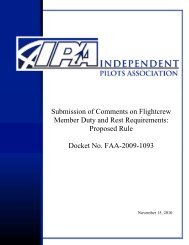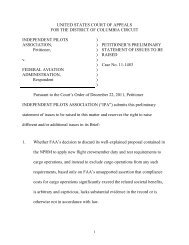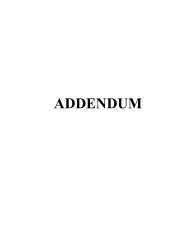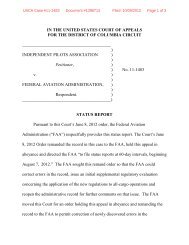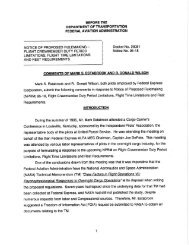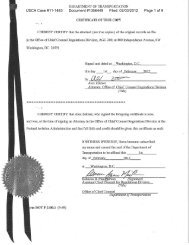Exhibits Vol 2 - Independent Pilots Association
Exhibits Vol 2 - Independent Pilots Association
Exhibits Vol 2 - Independent Pilots Association
You also want an ePaper? Increase the reach of your titles
YUMPU automatically turns print PDFs into web optimized ePapers that Google loves.
Sleep Research Online 5(2): 67-75, 2003<br />
http://www.sro.org/2003/Fletcher/67/<br />
Printed in the USA. All rights reserved.<br />
1096-214X<br />
© 2003 WebSciences<br />
Prediction of Performance during Sleep Deprivation<br />
and Alcohol Intoxication using a Quantitative Model<br />
of Work-Related Fatigue<br />
Adam Fletcher, Nicole Lamond, Cameron J. van den Heuvel and Drew Dawson<br />
The Center for Sleep Research, University of South Australia<br />
Shift work and particularly night work can cause fatigue with subsequent negative impacts on health, sleep, and alertness. To<br />
facilitate better management of work-related fatigue, we have developed, optimized and validated a computerized model that<br />
can predict changes in performance, vigilance, sleepiness, and tiredness. The present study is a laboratory-based validation<br />
that demonstrates the further utility of the model in predicting performance impairment resulting from sleep deprivation and<br />
alcohol intoxication. Twenty-two healthy volunteers (mean age=22.0 years) each completed three counter-balanced<br />
laboratory conditions: sleep deprivation, alcohol intoxication, and a placebo control condition. In each condition, subjects<br />
were woken at 0700 h and performance on a variety of tests was measured hourly from 0800 h. The tests at 0800 h were then<br />
used as a relative baseline to which all other performance data were expressed. The six measures of performance assessed<br />
were grammatical reasoning (response latency and accuracy), unpredictable tracking score, vigilance (response latency and<br />
accuracy), and simple sensory comparison score. Regression analyses indicated that the fatigue model predicted between 47<br />
and 89% of the variance in actual performance measures. Thus, there were moderate to very strong significant relationships<br />
between work-related fatigue model predictions and neurobehavioral performance as measured under laboratory conditions.<br />
CURRENT CLAIM: Following both sleep deprivation and alcohol intoxication, there are moderate to very strong relationships<br />
between work-related fatigue model predictions and objective neurobehavioral performance measures.<br />
In performing shift work, particularly nightshift, many<br />
individuals experience sleep deprivation (SD) and increased<br />
fatigue (Glazner, 1991; Paley and Tepas, 1994; Luna et al.,<br />
1997). In turn, these can negatively impact on a range of<br />
factors including sleep (Åkerstedt, 1988, 1995; Åkerstedt et<br />
al., 1991; Kecklund et al., 1997), neurobehavioral performance<br />
(Tilley and Wilkinson, 1984; Gillberg et al., 1994; Dinges et<br />
al., 1997), as well as health and safety (Fossey, 1990; Tucker et<br />
al., 1996; Spurgeon et al., 1997).<br />
The Relative Effects of Sleep Deprivation and Alcohol on<br />
Performance<br />
The relative performance impairment associated with SD has<br />
been compared qualitatively to impairment due to alcohol<br />
intoxication (Peeke et al., 1980; Krull et al., 1993; Roehrs et<br />
al., 1994). The observed declines in performance with either<br />
SD or alcohol intoxication are potentially dangerous and<br />
contribute to an increased risk of accidents and incidents at<br />
work (e.g., Gold et al., 1992; Smith et al., 1994; Dinges, 1995;<br />
Smith et al., 1998). Furthermore, previous research has<br />
quantitatively compared the levels of performance impairment<br />
associated with SD and alcohol intoxication and shown that the<br />
SD and fatigue associated with common shift schedules can<br />
produce impairment greater than what would be acceptable if<br />
it were due to alcohol intoxication (Dawson and Reid, 1997;<br />
Lamond and Dawson, 1999; Williamson and Feyer, 2000).<br />
The specific changes observed in performance following SD<br />
include significant impairments to hand-eye coordination,<br />
decision making, memory, cognition, visual search<br />
performance, response speed, and response accuracy (Linde<br />
and Bergstrom, 1992; Fiorica et al., 1968; Babkoff et al.,<br />
1988). In addition to cognitive factors, affective components<br />
of behavior, such as motivation and mood, are also adversely<br />
affected with increasing duration of SD (Babkoff et al., 1988).<br />
With moderate levels of both SD and alcohol intoxication,<br />
there is mild impairment on performance tasks, decreased<br />
alertness, and reduction in amplitude of EEG components<br />
(Goldberg, 1966; Wallgren and Barry, 1970; Naitoh et al.,<br />
1971; Kopell et al., 1972; Johnson and Naitoh, 1974).<br />
However, there are some differences between the autonomic<br />
effects of SD and alcohol intoxication. For example, alcohol<br />
increases heart rate but SD appears to have little or no effect<br />
(Koller et al., 1966). There are also differences in affect, with<br />
alcohol decreasing (Greenberg and Carpenter, 1956) and SDincreasing<br />
indicators of anxiety (Hord et al., 1975).<br />
Given the evidence above that the general neurobehavioral<br />
impairments due to SD and alcohol are quantitatively similar,<br />
it is paradoxical that fatigue-related performance impairment<br />
has not been subject to similar levels of regulatory intervention<br />
as alcohol intoxication. Despite the dangers posed by workrelated<br />
fatigue, few organizations or policy makers currently<br />
attempt to manage workplace fatigue in any systematic or<br />
quantitative manner. It thus seems appropriate to extend the<br />
scope of our previous modeling work to equate the impairment<br />
associated with SD and alcohol intoxication with work-related<br />
fatigue. If fatigue, sleep deprivation and alcohol intoxication<br />
Correspondence: Adam Fletcher, Ph.D., The Center for Sleep Research, University of South Australia, 5th Floor Basil Hetzel Institute,<br />
The Queen Elizabeth Hospital, Woodville SA 5011, Australia, Tel: 011-618-8222-6624, Fax: 001-618-8222-6623, E-mail:<br />
adam.fletcher@unisa.edu.au.



